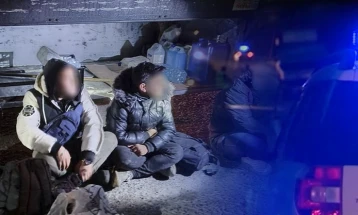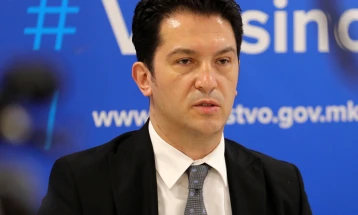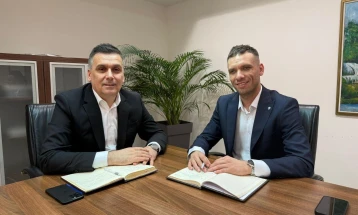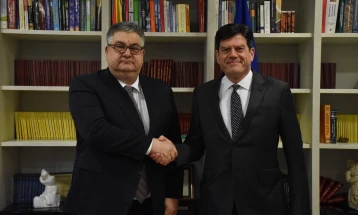PFD: Leadership, vision, pragmatism, integration, inclusiveness as key for reconciliation in the Balkans
- Open issues between all of our countries remain a never-healing wound and source of despair, and also a spring of possibilities for political manipulation, and installing fear and inventing enemies has shown a very productive way to grasp power and maintain a status quo with no progress, First Deputy PM Artan Grubi told a panel on "Reconciliation and Democracy as Catalyst of Change in the Balkans" held as part of the third Prespa Forum Dialogue (PFD) taking place in Struga.
- Post By Nevenka Nikolik
- 19:25, 15 June, 2023
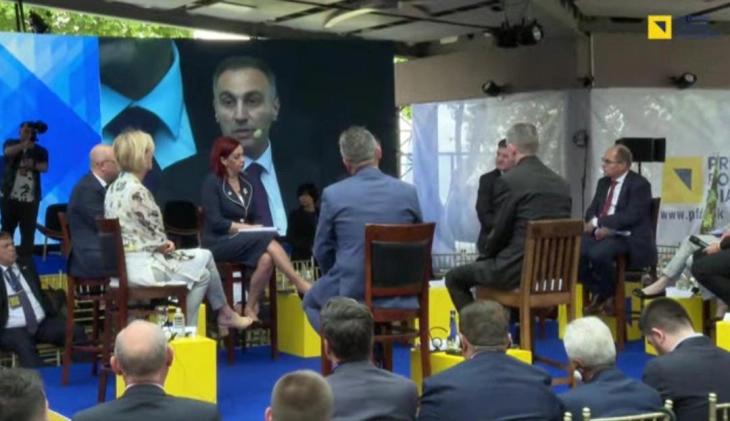
Struga, 15 June 2023 (MIA) – Open issues between all of our countries remain a never-healing wound and source of despair, and also a spring of possibilities for political manipulation, and installing fear and inventing enemies has shown a very productive way to grasp power and maintain a status quo with no progress, First Deputy PM Artan Grubi told a panel on "Reconciliation and Democracy as Catalyst of Change in the Balkans" held as part of the third Prespa Forum Dialogue (PFD) taking place in Struga.
"None of us lost anything from Ohrid Agreement, none of us lost anything from the Prespa Agreement, none of us will lose anything from the Good Neighborly Agreement with Bulgaria. The state, the region and all of us want the same - one more additional step is needed to completion. But nobody can dispute the existence of the Macedonian language, Macedonian people and the existence of our state. The world will not cease to exist the day after we make the necessary decisions," said Grubi.
He noted that all the wishes and preconditions of the opposition have been accepted, for VMRO-DPMNE to vote for the constitutional amendments.
"What we need is a total reset of the generation, we need to be the generation of leaders that will decide to go forward, ready to embrace Western values," Grubi said.
The EU Special Representative for the Belgrade-Pristina Dialogue, Miroslav Lajčák, called on regional politicians to leave the past to historians and work on what they have been elected for - to change the future for the better.
"It is the culture of compromise that made the EU the most successful integration project in the history of humankind, a project based on dialogue... My second message to the politicians is please believe there is a win-win solution through dialogue and it would be very good if it becomes the norm in the Balkans," said Lajčák.
He noted that it takes leaders with vision and courage, adding that the vision of EU is here and leaders need to turn this vision into reality.
Germany's Special Envoy for the Western Balkans Manuel Sarrazin said it is pragmatism that is missing in the Balkans, to understand the circumstances and the historical moment... He pointed to the need for citizens in the region to really have the opportunity to feel the rule of law, that parameter that makes the difference between democracy and non-democratic societies. According to Sarrazin, the current developments in the world additionally require all six countries in the Western Balkans not to miss the historical momentum.
High Representative for Bosnia and Herzegovina Christian Schmidt pointed out that the policies of just looking of the own interests of the Western Balkan countries without taking into account the interests of the others will not deliver sustainable development in the region.
He pointed to the relations between Germany and France as an example, arranged in such a way as to be of benefit and interest to the citizens of both countries, regardless of their historical misunderstandings.
"It is over, so why shouldn't this be possible in the Western Balkans. The message from the EU is about lowering the tendency and the need for conflict situations..." he noted.
Participants in the panel session also pointed out that for sustainable long-term solutions for the Western Balkan countries, it is still necessary to cultivate the culture of knowing that all decisions made in the region are made by the leaders of the countries themselves, i.e. to overcome the impression that they are solutions imposed by another side.
Photo: MIA


